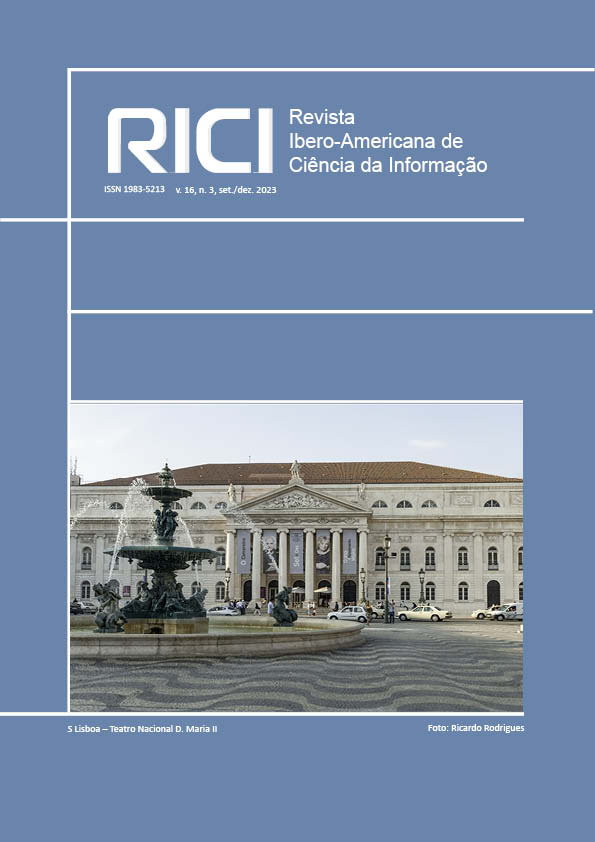Indicators for the evaluation of information literacy
possibilities for public policies, with a focus on informational justice
DOI:
https://doi.org/10.26512/rici.v16.n3.2023.47162Keywords:
Information Literacy, Public policy, Information justiceAbstract
In this paper, we are interested in recognizing indicators for public policies that can serve Information Competence and informational justice to minimize information vulnerability through theories and concepts. This research presents a qualitative approach and bibliographic and documental procedures. The data analysis was based on categorization, grouping of elements, ideas, or expressions that were of interest to the research purposes. Bibliographical research was carried out in Scopus, Web of Science, ISTA, and LISTA. As main results, it is worth mentioning that social indicators are fundamental components and subsidies to public policies for Information Literacy and for this reason should be studied and connected to this field/domain of informational justice, and also that this is an urgent topic for a research agenda in the research agenda in the identified areas, which will strengthen the evidence for the promotion of for the promotion of public policies on Information Literacy.
Downloads
References
American Library Association (ALA). 61. Library services for the poor. Huron Chicago: ALA, 2007. Disponível em: https://www.ala.org/ala/ourassociation/governingdocs/policymanual/servicespoor.htm. Acesso em: 10 ago. 2023.
American Library Association (ALA). Association of College and Research Libraries (ACRL). ACRL Guide to Policies and Procedures, Chapter 14: Standards, Guidelines, and Frameworks. Chicago: ALA/ACRL, 2022. Disponível em: https://www.ala.org/acrl/resources/policies/chapter14. Acesso em: 10 ago. 2023.
American Library Association (ALA). Library Bill of Rights. Chicago: ALA, 2019. Disponível em: https://www.ala.org/advocacy/intfreedom/librarybill. Acesso em: 10 ago. 2023.
Fachin, Odília. Fundamentos de metodologia: noções básicas em pesquisa científica. São Paulo: Saraiva, 6. ed., 2017. ISBN: 9788502636538. p. 209.
Gregory, Lua; HIGGINS, Shana. Reorienting an Information Literacy Program toward Social Justice: Mapping the Core Values of Librarianship to the ACRL Framework. Communications in Information Literacy, Buffalo, NY, v. 11, n. 1, p. 42-54, 2017. Disponível em: https://pdxscholar.library.pdx.edu/comminfolit/vol11/iss1/14/. Acesso em: 10 ago. 2023.
Marzal, Miguel Ángel; Parra, Pablo, Colmenero, María Jesús. La medición de impacto y evaluación de programas de alfabetización en información para bibliotecas escolares. Revista Española de Documentación Científica, Madrid, v. 34, n. 2, p. 190-211, 2011. Disponível em: https://redc.revistas.csic.es/index.php/redc/article/view/692. Acesso em: 10 ago. 2023.
Mathiesen, Kay. Informational justice: a conceptual framework for social justice in Library and Information Services. Library Trends, Champaign, IL, v. 64, n. 2, p. 198–225, 2015. Disponível em: https://core.ac.uk/download/pdf/158312901.pdf. Acesso em: 10 ago. 2023.
Minayo, Maria Cecília de Souza. Pesquisa social: teoria, método e criatividade. Petrópolis: Vozes, 26. ed., 2002.
Richardson, Roberto Jarry. Pesquisa social: métodos e técnicas. São Paulo: Atlas, 3. ed., 2012.
Vitorino, Elizete Vieira. A competência em informação e a vulnerabilidade: construindo sentidos à temática da “vulnerabilidade em informação”. Ciência da Informação, Brasília, DF, n. 2, v. 47, p. 71-85, 2018. Disponível em: https://brapci.inf.br/index.php/res/v/99215. Acesso em: 10 ago. 2023.
Vitorino, Elizete Vieira; De Lucca, Djuli Machado. (Org.). As dimensões da competência em informação: técnica, estética, ética e política. Porto Velho, RO: EDUFRO, 2020. Disponível em: https://edufro.unir.br/uploads/08899242/Capas%206/As%20Dimensoes%20da%20Competencia%20em%20Informacao.pdf . Acesso em: 10 ago. 2023.
Vitorino, Elizete Vieira; Piantola, Daniela. Dimensões da competência informacional. Ciência da Informação, Brasília, DF, v. 40, n. 1, p. 99-110, 2011. Disponível em: http://revista.ibict.br/ciinf/article/view/1328. Acesso em: 10 ago. 2023.
Vitorino, Elizete Vieira. Indicadores para a competência em informação no Brasil: virtudes e tendências. In: Parra Valero, Pablo et al. (Coord.). Competencias en información y transformación digital de la sociedad. Madrid: Universidad Complutense, Facultad de Ciencias de la Documentación, Departamento de Biblioteconomía y Documentación, 2021. p. 87-104. Disponível em: https://hdl.handle.net/20.500.14352/9352. Acesso em: 10 ago. 2023.
Vitorino, Elizete Vieira. Indicadores para a competência em informação no Brasil: virtudes, tendências e possibilidades. Perspectivas em Ciência da Informação, Belo Horizonte, v. 27, n. 2, p. 7-36, abr./jun. 2022. Disponível em: https://periodicos.ufmg.br/index.php/pci/article/view/39996/30698. Acesso em: 10 ago. 2023.
Weiner, Sharon A. How information literacy becomes policy: an analysis using the Multiple Streams Framework. Libraries Faculty and Staff Scholarship and Research, West Lafayette, IN, v. 60, n. 2, p. 297-311, 2011. Disponível em: https://docs.lib.purdue.edu/lib_fsdocs/70/. Acesso em: 10 ago. 2023.
Downloads
Published
How to Cite
Issue
Section
License
Copyright (c) 2023 Elizete Vieira Vitorino, Andréia Letícia Johann

This work is licensed under a Creative Commons Attribution 4.0 International License.
Copyright Notice
Authors who publish in this journal agree to the following terms:
- Authors retain copyright and grant the journal right of first publication with the work simultaneously licensed under the Creative Commons Attribution License 4.0, allowing the sharing of work and recognition of the work of authorship and initial publication in this journal.
- Authors are able to take on additional contracts separately, non-exclusive distribution of the version of the paper published in this journal (ex.: distribute to an institutional repository or publish as a book), with an acknowledgment of its initial publication in this journal.
- Authors are permitted and encouraged to distribute their work online (eg.: in institutional repositories or on their website) at any point before or during the editorial process, as it can lead to productive exchanges, as well as increase the impact and citation the published work.
















